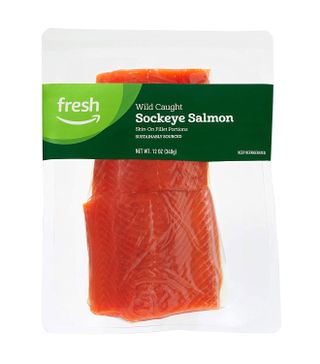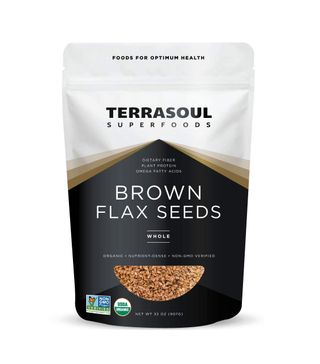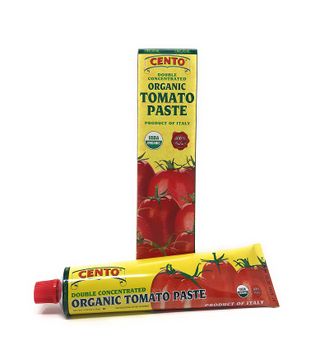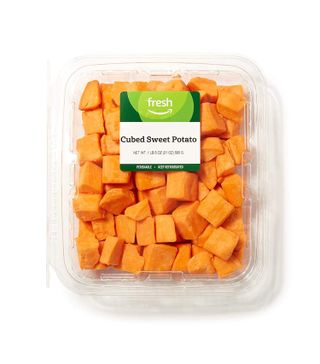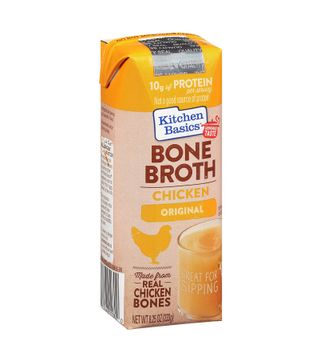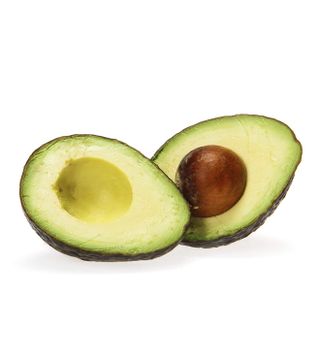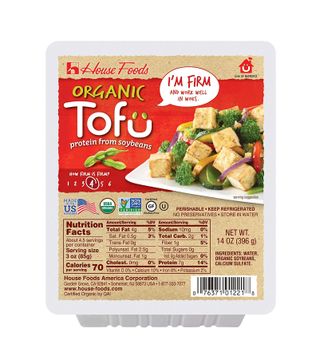If You're Not Adding These Foods to Your Diet, Your Skin Health Is Missing Out

What you eat can affect your body, both inside and out. Your diet plays a role in the health and well-being of many systems in the body, including your skin. Maya Feller, MS, RD, CDN, of Brooklyn-based Maya Feller Nutrition, says that our pattern of eating can influence our gut microbiome and in turn impact our skin microbiome. "Studies have found that the standard American diet, generally rich in added sugars, salts, and synthetic and saturated fats, results in systemic inflammation and can manifest through the skin in forms such as psoriasis," she explains. "Additional studies have found eating patterns with higher intakes of vitamin C and nutrients found in almonds are associated with fewer wrinkles, and high intakes of linoleic acid, an essential fatty acid, are associated with a lower likelihood of facial dryness."
It doesn't mean you have to adhere to an extremely strict diet, though. Yes, there are superfoods for skin health, but moderation is key, too. "Occasionally eating sweets or having a glass of wine here or there likely won't cause a problem, but it's what we do on a daily basis that will have a big effect on overall skin health," says Carolyn Brown, MS, RD, co-founder of Indigo Wellness Group.
And diet isn't the only factor when it comes to your skin health—Alli Magier, MS, RDN, LDN, a registered dietitian at Rooted Wellness, says, often, hormones and genetics can play a large role. "A diet filled with processed foods with added salt and sugar, fried foods, refined carbohydrates, and low fat or skimmed dairy can often increase the inflammation in the body. This inflammation is often manifested as acne on your skin," Magier says. "If hormones are mainly the reason for your breakouts, doing hormone testing through a functional medicine practitioner can help get to the root cause and balance your hormones for good."
The Best Vitamins and Nutrients for Skin Health

As for what vitamins and nutrients support skin health, there are a number to know about. Vanessa Rissetto, MS, RD, a registered dietitian nutritionist and the co-founder of Culina Health, says vitamin A is one of the most well-recognized nutrients for healthy skin. "Synthetic retinoids have been commonly prescribed for the treatment of several skin conditions, including acne, eczema, and psoriasis since the 1980s," she explains. "Vitamin A contributes to healthy skin by promoting skin cell growth and turnover. It helps fight acne by inhibiting oil secretion in the skin and decreasing androgen production. If you have rough, dry, scaly skin and/or small raised bumps on the back of your arms (known as hyperkeratosis pilaris), it may be a sign that you are vitamin A deficient."
Feller adds that vitamin C is important since it's necessary for stimulating collagen synthesis, and since it's an antioxidant, it can help protect the skin against sun-related damage. "Carotenoids such as beta-carotene, lutein, zeaxanthin, and lycopene serve skin cells as a powerful antioxidant, helping reduce the damage to the skin from the surrounding environment," she says. "Zinc is another powerful mineral for skin health, which helps to protect against UV radiation, enhances wound healing, and provides antioxidant protection for the skin."
Omega-3 fats have also been shown to reduce the risk of acne and effectively treat or improve skin conditions like atopic dermatitis and psoriasis, says Tamar Samuels, MS, RDN, CDN, a registered dietitian, a national board–certified health and wellness coach, and the co-founder of Culina Health. If you're getting enough omega-3s (like sardines, salmon, and mackerel), then you might notice smoother and younger-looking skin because of a decrease in inflammation.
Biotin is another vitamin for skin health—you've probably seen biotin supplements that promote skin, hair, and nail health. "This water-soluble B vitamin helps regulate fatty-acid metabolism, which is critical for healthy skin," Samuels explains. "Biotin deficiency leads to impaired fat production, which tends to manifest in the skin first. Some common signs of biotin deficiency include hair loss and scaly, red, and inflamed skin around the mouth and other areas of the face and scalp. Biotin deficiency can also be a cause of dandruff for some people."
And since your gut health can affect your skin health, probiotics may be good for the skin, too. Rissetto says that probiotics benefit skin health through a number of different mechanisms, including balancing the gut microbiome and decreasing inflammation and oxidative stress.
The Best Superfoods for Skin Health
Now that you know about the vitamins and nutrients to prioritize for skin health, the experts shared some of their favorite foods that are packed with them. See below.
1. Salmon

"Fatty fish is a top source of omega-3 essential fatty acids, which play an essential role in the functioning and appearance of our skin and can influence how our skin responds to inflammation," Magier explains. "Essential fatty acids, ceramides, and other lipids layer upon each other to bolster our skin's surface and form a lipid barrier. Since the lipid composition of our skin is closely tied to dietary fat intake, and inadequate intake of essential fatty acids like omega-3s is associated with serious skin diseases, up your omega-3s with fatty fish like salmon, sardines, mackerel, and herring."
2. Seafood

Seafood like oysters, scallops, and shellfish are great sources of zinc, which we know protects against UV radiation, provides antioxidant benefits, and helps with wound healing. Samuels adds that studies have shown that zinc may be particularly beneficial for healing acne and other skin conditions like eczema.
3. Nuts and Seeds

"There's so much to love about nuts and seeds. Not only are they great sources of protein and fiber, but they're also packed with skin-boosting nutrients like healthy fats, vitamin E, zinc, and selenium," Magier says. "Zinc is a mineral involved in the skin's repair process and cell growth and its antioxidant capacity helps prevent UV damage. Selenium is another antioxidant in the body helping to protect against the harmful effects caused by free radicals. I am a fan of throwing chia and flax seeds into my oatmeal or nut butter with fruit as a snack."
Brown recommends hemp seeds—they're a plant source of omega-3s, and the oil from them can help with conditions like eczema, psoriasis, and dry skin. And Feller likes walnuts, which are also another plant-based source of omega-3 fatty acids—she says that the essential lipids help to form the protective skin barrier.
4. Tomatoes

"Tomatoes are loaded with lycopene, vitamin C, and carotenoids, which have been shown to protect your skin from sun damage," Brown says. If you can't get fresh tomatoes, Brown recommends trying tomato paste.
5. Sweet Potatoes

Magier says sweet potatoes, along with tomatoes, contain lycopene, lutein, and beta-carotene, which are pigments belonging to the carotenoid family. "These antioxidants protect against oxidative stress caused by UV light and environmental pollution," she explains. "Since carotenoids are fat-soluble compounds, eating them with healthy fats like olive oil, avocado, nuts, and seeds can boost their absorption."
6. Butternut Squash

Butternut squash also contains lycopene, lutein, and beta-carotene, so they provide a lot of antioxidant protection, too.
7. Fermented Vegetables

Brown says fermented veggies are full of good-for-your-gut probiotics and can help your skin by improving your digestion and keeping you regular. She adds that many fermented vegetables are also full of minerals and vitamins, including vitamin C.
8. Bell Peppers

"Rich in both vitamin C and carotenoids, bell peppers (especially red bell peppers) help with stimulating collagen synthesis and provide antioxidant protection from oxidative damage from the sun and other environmental factors," Feller says.
Bell peppers are also a great source of vitamin A, Magier adds. "Be sure to pair vitamin A–rich foods with a source of fat like avocado, olive oil, nuts, or seeds to enhance the vitamin’s absorption by the body," she says.
9. Bone Broth

"You've likely heard of collagen for skin health. Well, bone broth is the OG, unprocessed form of collagen," says Brown. "Sip on bone broth on its own, in soups, but you can also even put it in smoothies like Brodo broth shop in NYC does."
10. Avocados
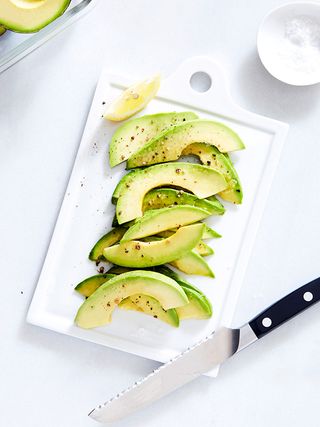
"Avocados are abundant in healthy fats, vitamin E, and carotenoids, which are all key players in strengthening our skin's resistance to physical stressors, UV radiation, and environmental pollution," Magier says. She adds that vitamin E shields our skin from UV radiation–induced oxidative stress, and excessive exposure to UV radiation can lead to chronic inflammation, compromised skin cell function, skin aging, and skin disease. If you want to boost your vitamin E intake, add foods like avocado, sunflower seeds, almonds, and fish.
11. Grapes

"Resveratrol found in red grapes is a powerful antioxidant that exhibits protective effects against ultraviolet radiation and reduces oxidative stress and inflammation in the skin, protecting against skin aging and skin cancers," Feller says.
12. Egg Yolks

Egg yolks are great sources of skin-supporting vitamin A and biotin.
13. Soy

Feller says the isoflavones in soy have been found to reduce the appearance of aging and wrinkles.
14. Green Tea
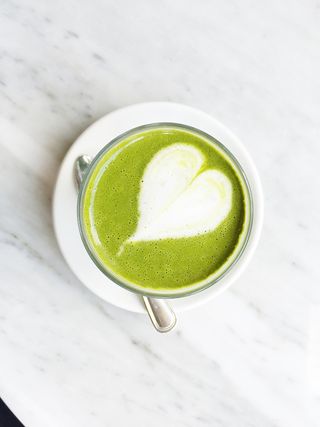
"Green tea contains compounds called catechins that improve your skin health, moisture, and elasticity and decrease redness," Brown says.
15. Water

"One of the most important and overlooked components of skin health is hydration status," Feller says. "Hydration can come from both beverages and food sources such as fruits and vegetables."
Next, 11 Foods That Will Get Your Gut Health Back on Track
Disclaimer
This article is provided for informational purposes only and is not intended to be used in the place of advice of your physician or other medical professionals. You should always consult with your doctor or healthcare provider first with any health-related questions.
Sarah is lifestyle writer and editor with over 10 years of experience covering health and wellness, interior design, food, beauty, and tech. Born and raised in Los Angeles, she attended New York University and lived in New York for 12 years before returning to L.A. in 2019. In addition to her work on THE/THIRTY and Who What Wear, she held editor roles at Apartment Therapy, Real Simple, House Beautiful, Elle Decor, and The Bump (sister site of The Knot). She has a passion for health and wellness, but she especially loves writing about mental health. Her self-care routine consists of five things: a good workout, “me” time on the regular, an intriguing book/podcast/playlist to unwind after a long day, naps, and decorating her home.
-
 I Only Ate Sakara Life Meals for 30 Days—Here Are 7 Things That Happened
I Only Ate Sakara Life Meals for 30 Days—Here Are 7 Things That HappenedThe brand's 30-Day Fall Reset is finally here.
By Erin Jahns
-
 The 6 Warning Signs You're Not Getting Enough Protein
The 6 Warning Signs You're Not Getting Enough ProteinAnd what to eat to up your intake.
By Sarah Yang
-
 Everything This Professional Ballet Dancer Eats to Fuel Her For Performances
Everything This Professional Ballet Dancer Eats to Fuel Her For PerformancesHer grocery staples include high-quality French butter.
By Candice Aman
-
 These 8 Foods Are the Worst for Rosacea—Here's What to Eat Instead
These 8 Foods Are the Worst for Rosacea—Here's What to Eat InsteadControl those flare-ups.
By Sarah Yang
-
 15 Things That Cause Bloating and How to Get Rid of It ASAP
15 Things That Cause Bloating and How to Get Rid of It ASAPTry these.
By Sarah Yang
-
 Is the Alkaline Diet Overhyped? What Experts Want You to Know
Is the Alkaline Diet Overhyped? What Experts Want You to KnowHere's how it works.
By Sarah Yang
-
 I'm an Imperfect Dietitian and My Key to Eating Healthy Meals Is Convenience
I'm an Imperfect Dietitian and My Key to Eating Healthy Meals Is ConvenienceTake a peek at my weekly grocery staples.
By Candice Aman
-
 Avoid These 6 Foods—They'll Wreck Your Gut Health
Avoid These 6 Foods—They'll Wreck Your Gut HealthWhat to eat instead.
By Sarah Yang
